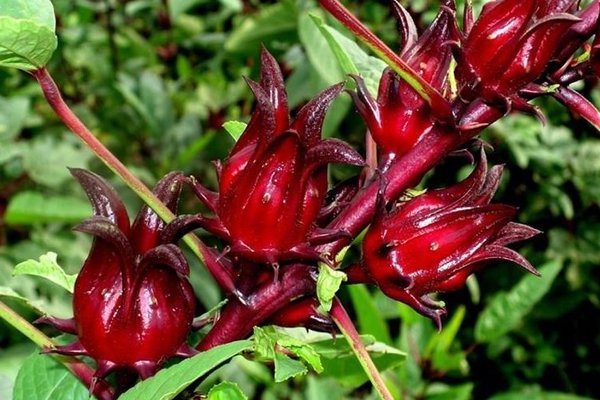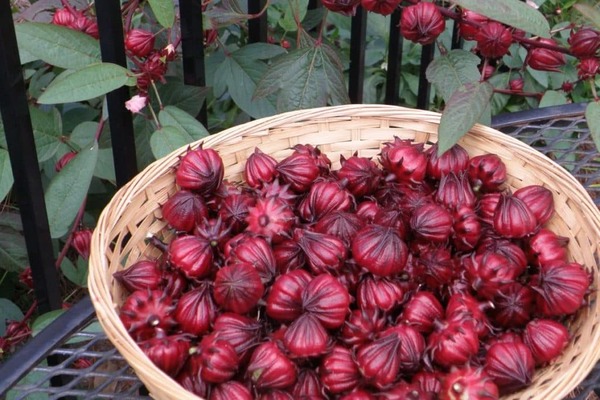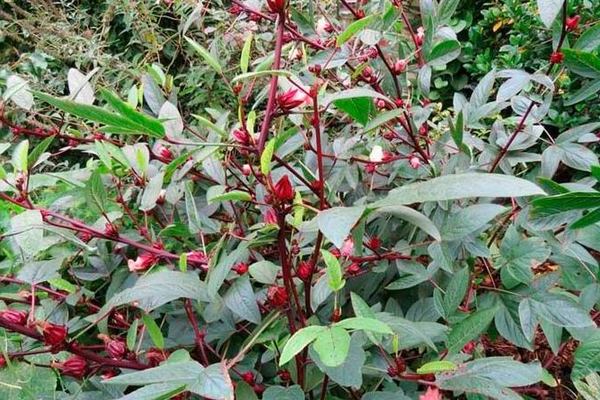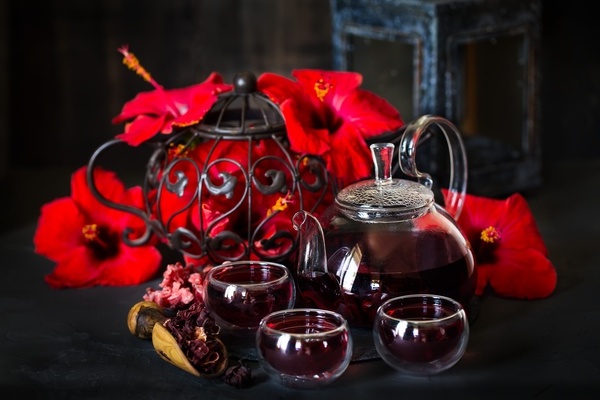Sudanese rose, hibiscus (hibiscus): description, cultivation, benefits
Content:
The article presents a Sudanese rose (hibiscus, hibiscus): a description of the plant, growing rules, benefits and healing properties.
The Sudanese rose is known mainly by the name "Hibiscus" (or Chinese rose "). Hibiscus bushes are often found in warm countries (Cyprus, Greece, Spain, Italy, Bulgaria, Turkey, etc.), and on vacation, seeing these beautiful large flowers, one involuntarily recalls pots with a Chinese rose from the Soviet era in schools, hospitals or on the windowsill by Grandma. In fact, the Sudanese rose belongs to the genus "hibiscus", the family "Malva". Hibiscus tea is made from some varieties of the Sudanese rose. And growing this culture is not very easy. Let's talk about whether it is possible to do this in our latitudes.
Sudanese rose: basic information

Sudanese rose: basic information

The Sudanese rose is known mainly by the name "Hibiscus" (or Chinese rose "). Hibiscus bushes are often found in warm countries (Cyprus, Greece, Spain, Italy, Bulgaria, Turkey, etc.), and on vacation, seeing these beautiful large flowers, one involuntarily recalls pots with a Chinese rose from the Soviet era in schools, hospitals or on the windowsill by Grandma.
In fact, the Sudanese rose belongs to the genus "hibiscus", the family "Malva". Hibiscus tea is made from some varieties of the Sudanese rose. And growing this culture is not very easy.
If only as a houseplant, Chinese rose or Chinese hibiscus grows beautifully on the south side of the house. But we are not talking about any tea here, hibiscus is made from a different variety.
The Sudanese rose has exceptionally deep purple flowers and the stem is greenish to red. The average height of the culture is 5 m. Places of growth - Sudan, Mexico, Thailand, India, China, Java, Sri Lanka.
Interestingly, the coat of arms of Malaysia is decorated with a Sudanese rose flower, and Muslim believers see its petals as a reminder of the five commandments of Islam.
Sudanese rose (hibiscus): reproduction, cultivation

Sudanese rose (hibiscus): reproduction, cultivation
Reproduction of the Sudanese rose is done using cuttings, and very rarely - using seeds. They are cut in the spring or summer months. To do this, take annual shoots and cut 10 centimeters so that 3-4 buds are present on one cut.
Next, the cuttings are planted in containers with earth (planting depth - up to 3 cm). Cover with transparent polyethylene. Not forgetting to spray every day, they often ventilate the room in the morning and evening hours.
The temperature regime of the room where the cuttings of the Sudanese rose are planted is 23-25 degrees.
As a consequence, the room should be ventilated more often. The temperature regime for summer is not lower than 22 degrees, for autumn - not lower than 17 degrees, for winter - 16.
If the temperature in the room is not suitable, then the plant begins to lose leaves and buds. Sometimes it is necessary to spray the plant with warm water.
As for the light mode, it should be bright, but without direct sunlight. In winter, additional lighting is needed.
When it comes to watering, caution is needed. Busting should be avoided, otherwise the plant may rot. And the shortage is not good. If there is not enough moisture, the buds will begin to fall off.
Here is such a capricious beauty - the Sudanese rose!
In spring and summer, do not forget to fertilize our beauty. Many home flower products will work. It is important not to forget to fertilize the plant after watering.
The benefits of the Sudanese rose, healing properties

The benefits of the Sudanese rose, healing properties
In places where it grows (Sudan, Mexico, Thailand, India, China, Java, Sri Lanka), this plant is considered a medicine. Gulls from this valuable plant - hibiscus - are rich in vitamin C, helps against flu and colds. However, if you drink too much of it, you cannot avoid the laxative effect.
Sudanese rose petals, even when dried, contain tartaric, citric and malic acid. This is why the hibiscus flavor is slightly bitter.
As a result of numerous studies and experiments, American scientists began to assert the benefits of this tea for hypertensive patients. The decrease in blood pressure in hypertensive patients consuming Hibiscus tea was 7%.
Scientists around the world continue to argue about the benefits and dangers of hibiscus tea. But still they are inclined to believe that, in general, this is a healthy drink that only improves the health of the human body.
Sudanese rose (hibiscus): benefits. More about the properties of petals
- Since the petals are rich in antioxidants, hibiscus removes free radicals from the body, thereby being a prophylactic agent against all kinds of tumors.
- Competently brewed Hibiscus fights heartburn.
- Regular hibiscus tea will relieve constipation and atony in the large intestine.
- Hibiscus increases immunity, strengthens the body, as it contains the necessary vitamins and minerals in its mass.
- If cholesterol exceeds the norm, it is very useful to use it.
- For diabetics, this is a drink that will help you fight diabetes!
- For psoriasis and various eczema, applications of hibiscus infusion will help.
- Due to the diuretic effect, hibiscus relieves swelling and expels excess fluid from the body.
- This tea is useful for vascular diseases, as it strengthens the capillaries.
- Colds recede when drinking tea from the petals of this wonderful plant. By lowering body temperature, it promotes recovery.
Are there any harmful consequences?
If there are no chronic diseases, then it is completely safe to use hibiscus.
Only with some of them is it necessary to limit its use. Let's tell you more.
- If you suffer from any allergic reactions, then you should carefully drink this tea.
- Those with increased acidity of the stomach should not drink hibiscus.
- For pregnant women and young mothers, hibiscus can be drunk in small quantities.
- Hypotensive patients should not start drinking this drink, as it lowers blood pressure.
- And this recommendation is for everyone: measure is needed in everything, because the most useful product will not be good if consumed in large quantities.
Grow Sudanese rose, drink hibiscus and be healthy!
Sudanese rose (hibiscus)

